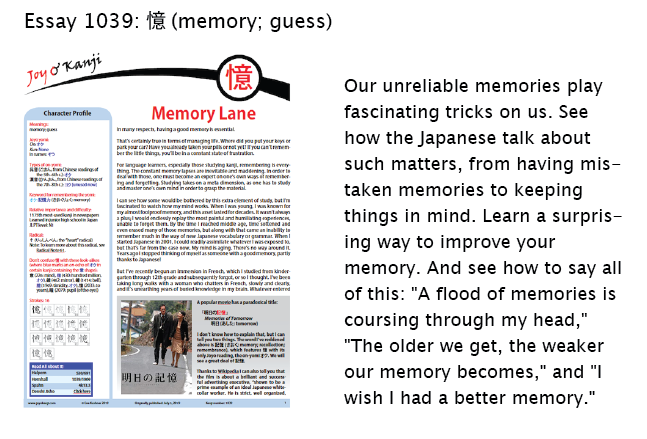From Serious Practice to Unfounded Nonsense in a Flash
I really like this artistic ad, and I've now used it in two essays:

Photo Credit: Eve Kushner
It's an ad for learning to play the koto (琴: Japanese zither), so not surprisingly the image appears in essay 1178 on 琴. I've also included the photo in the newly published essay 1039 on 憶 (memory; guess) because of the all-important word 記憶力 (きおくりょく: memory) in the fourth column from the right:
指先刺激で記憶力UP
Massaging the fingertips improves your memory
指先 (ゆびさき: fingertip); 刺激 (しげき: stimulation)
Playing the koto massages your fingertips, so the claim here is that if you take koto lessons, not only will you learn to play an instrument but your general memory will also improve. I’m more than a little skeptical!
A word in the previous column has also caught my attention. Here's what that third line says:
イスに座ってお稽古です
Practice sessions are done sitting in a chair
イス (椅子: chair); 座る (すわる: to sit); 稽古 (けいこ: practice)
In these classes you don’t have to torture yourself by kneeling, as koto players traditionally do. I'm glad because simply imagining that position makes my aging knees hurt.
And speaking of being old, why does 稽古 end with 古 (old)?
Ah, most of my proofreader's sources actually break down the term this way:
稽古 (けいこ: practice) to think + past
They indicate that 稽古 originally meant "to think about the past," which connects to "to read old books and study," which further connects to "to practice."
Is this the "practice makes perfect" kind of practice? No, the Japanese use 稽古 primarily for artistic accomplishments or martial arts, especially traditional ones. When it comes to the arts, that includes the tea ceremony, flower arranging, and Japanese dance and music. In the realm of martial arts, the term works in reference to karate, judo, and kendo. Kojien adds that it's now acceptable to use 稽古 for Western arts such as piano, violin, and ballet. (This brings to mind a famous comment by cellist Pablo Casals about why he practiced for hours a day even in old age.)
All this talk of practicing sounds quite serious, so I'm intrigued that 稽 appears in the following light-hearted word:
滑稽 (こっけい: funny; humorous; comical; laughable; ridiculous; joking)
Sources present two theories about this word.
Theory 1:
滑稽 (こっけい: funny; humorous; comical; laughable; ridiculous; joking)
to confuse, random + same
The term originally meant "a smoothly eloquent person who skillfully makes other people become confused about right and wrong."
Theory 2:
滑稽 (こっけい: funny; humorous; comical; laughable; ridiculous; joking)
smooth + a type of container for alcohol
Originally, 滑稽 meant "words smoothly coming out of one's mouth as if alcohol brimmed over the container."
I like the second one better!
The term 滑稽 has given rise to this spinoff, in which the yomi completely changes:
滑稽者 (おどけもの: idiot; dummy; joker; fool; trickster)
I initially misread the 滑 as 骨 (bone), and I was hoping that the funny bone came into the picture here. But no, this bone is wet, thanks to the "water" radical 氵. Primarily, 滑 means "to slide" or "smooth," and in 滑稽 it represents "to speak smoothly and glibly" or "to crack jokes," according to Halpern.
Let's go back to 稽, which makes less sense to me. Get a good look at its odd shape:
稽
That bit on the top right looks quite awkward and ill-thought-out, which is ironic, given the meaning of this word:
稽える (かんがえる: to consider; think about)
As 稽 has just one Joyo reading, ケイ, 稽える features a non-Joyo kun-yomi alternative to the usual rendering—namely 考える (かんがえる: to think (about)).
The next term shows us what happens when people don't stop to think about things:
無稽 (むけい: unsupported; unfounded; nonsense) not + grounded
If you're as intolerant as I am of nonsense, be sure to check out the newest essay, which offers lots of grounded information about various kinds of memory:
Catch you back here next time!
❖❖❖
Did you like this post? Express your love by supporting Joy o' Kanji on Patreon:



Comments